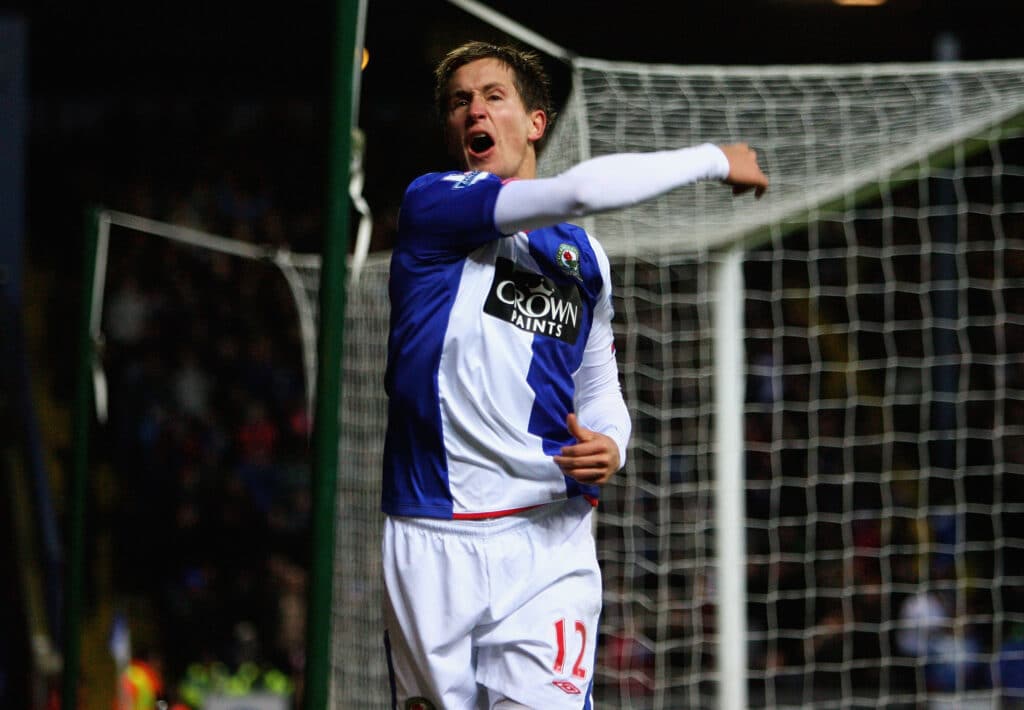
There was this viral tweet a few years ago that stated that “dudes can literally just sit around and name old sports players and just have the best time”. It’s true. Reminiscing upon players of the past who shaped key moments of your childhood is a truly entertaining activity.
Dudes can literally just sit around and name old sports players and just have the best time.
— E.M. Hudson (@EMHudsonlives) July 15, 2021
Recently, this idea has become a trend on X (Twitter), where people share their thoughts on the ultimate ‘Barclaysman’.
A player that defines the vibe, soul and heritage of the Premier League between 2001 – 2016, the years when the league was sponsored by Barclays, a British bank
Barclaysman (our best definition)
A Barclaysman doesn’t necessarily mean the best player of the time. It means a player that defines the era, the style and the mood of the time. A cult hero, if you will. Leighton Baines is a good example, just to get us started.
They must be unique. Whether it was ridiculously long throw-ins, a crazy haircut or a wild celebration, our Barclaysmen must be remembered for their distinctiveness.
The whole trend has sparked furious debates on X, for example, whether or not Barclaysmen still exist. Many believe no, pining for the times of the past whilst decrying that the modern era simply does not cut it. Others affirm that of course they still exist, myself included. In ten years, Bryan Mbeumo and Tomas Soucek will be considered in the same vein as the other players on our list now.
Some call these “Streets won’t forget” players, others now say “Barclaysmen”. Either way, here is our ultimate list of the ballers that you simply can’t forget.
We had to find out the squad's favourite #Barclaysmen. ? pic.twitter.com/RJcbv27G7O
— Fulham Football Club (@FulhamFC) September 11, 2024
The Barclaysman List
Michu – Swansea
Erling Haaland’s hero, Michu epitomizes the one-season wonder, which makes him a quintessential Barclaysman. Arriving at Swansea in 2012 for a modest £2 million from Spanish side Rayo Vallecano, he stunned the Premier League with 18 league goals in his debut season. His blend of lethal finishing and a penchant for ghosting into the box made him a nightmare for defenders.
Streets will never forget @Michuoviedo https://t.co/2LFfgb1YRQ
— Erling Haaland (@ErlingHaaland) February 24, 2020
Michu’s peak was rapid and fleeting, capturing the imagination of fans who loved an underdog success story. His celebration – hand cupped to ear – became iconic, symbolizing his brief but bright period of stardom in the Premier League. Injuries curtailed his rise, and after a swift disappearance from the limelight, he became a legend for having one of the most explosive single seasons of the Barclays era.
Morten Gamst Pedersen – Blackburn
Pedersen was the poster child for stylish left-footers during his time at Blackburn. Known for his stunning goals from free kicks and long-range shots, Pedersen delivered moments that Premier League fans will always associate with Blackburn’s presence in the top flight.
He was more than just a flair player—his work rate and consistency made him a key figure for Blackburn for nearly a decade. His ability to whip in dangerous crosses from the left flank made him a throwback to the traditional winger, while his flashy hair and technical ability added to his cult hero status. Pedersen’s combination of skill and loyalty to Blackburn Rovers made him a fan favorite and a quintessential Barclaysman of that era.

Benjani Mwaruwari – Portsmouth
Benjani, with his infectious smile and tireless work rate, became a fan favorite at Portsmouth. Signed from Auxerre in 2006, Benjani was a physical forward known for his industrious play rather than prolific goal-scoring. His most memorable moment came in the 2007-2008 season when he scored 12 goals, including a hat-trick against Reading in an iconic 7-4 victory.
Benjani’s habit of missing easy chances but scoring difficult ones made him a lovable enigma, while his never-give-up attitude resonated with fans. His celebration, smiling and pointing to the Portsmouth badge, endeared him to fans and made him a quintessential Barclaysman. He wasn’t flashy, but he represented the working-class ethos of the Premier League, particularly during a time when Portsmouth was competing for trophies under Harry Redknapp.
Benoit Assou-Ekotto – Tottenham
Just to give an idea about the kind of character that Assou-Ekotto was, here’s a first person character reference from Peter Crouch, Tottenham’s striker at the time.
“He was so difficult to manage, he didn’t do anything he was supposed to do. He showed up with a Tesco bag for pre-match meals. He refused ice baths & had 0 interest in football whatsoever. On matchdays, he had no idea about who we (Tottenham) played against.”
– Peter Crouch
Assou-Ekotto was a left-back who brought a unique swagger and nonchalance to the Premier League. Known as one of the coolest players to ever grace the league, his laid-back attitude, both on and off the pitch, made him a cult figure at Tottenham. He famously admitted that he didn’t love football but saw it as just a job, which only added to his mystique.
Despite this, Assou-Ekotto was solid defensively and could offer attacking support when needed. His distinctive hair and calm, almost effortless style of play made him a standout. The Premier League during this era was full of characters, and Assou-Ekotto, with his eccentric interviews and honest opinions, became the embodiment of a player who didn’t fit the traditional mold, yet still thrived at the highest level.
Rory Delap – Stoke
Rory Delap wasn’t just known for his midfield capabilities but became a Premier League icon due to his absurdly long throw-ins. Stoke City under Tony Pulis utilized Delap’s throw-ins as a devastating weapon, treating them like set-pieces. He could launch the ball with such force and accuracy that it often caused chaos in the opposition’s box, leading to numerous goals.
His throw-ins became so feared that teams would deliberately alter their defensive setups just to deal with them. Boaz Myhill, West Brom goalkeeper, once purposely kicked the ball out for a corner instead of a throw-in, just because Delap was on the pitch. Delap was the epitome of the pragmatic, no-nonsense style that Stoke became infamous for during their time in the Premier League. He was a player who made an impact through one very specific skill, and his ability to turn a mundane throw-in into a game-changing moment makes him a quintessential Barclaysman.
Once in a while I think about how insane it was that Boaz Myhill preferred to concede a corner over a throw in because of Rory Delap ???pic.twitter.com/G617NU6ZGk
— TNSF (@TNSF_) September 9, 2024
Ali Al-Habsi – Wigan
Ali Al-Habsi, Wigan’s Omani goalkeeper and the only Omani to ever play in the league, was an ever-present figure during the club’s years of punching above their weight in the Premier League. A towering presence between the sticks, Al-Habsi was known for his incredible reflexes, often making jaw-dropping saves to keep his team in the game. His heroics were crucial in keeping Wigan in the Premier League, including during their dramatic 2011-2012 season survival when they managed to avoid relegation against the odds.
Al-Habsi’s eccentric style, such as his brightly colored gloves and acrobatic dives, made him a memorable character. Wigan’s status as perennial underdogs meant they often faced relentless attacks from bigger teams, and Al-Habsi’s performances were vital in helping them defy expectations year after year. His importance in their FA Cup-winning season in 2012-2013 further cements his Barclaysman status.
Yannick Bolasie – Crystal Palace
Yannick Bolasie was the ultimate entertainer during his time at Crystal Palace, known for his outrageous skill moves, lightning pace, and ability to take on defenders with ease. Bolasie was a winger who could excite fans with moments of brilliance, often leaving defenders in his wake with his unpredictable dribbling. His flair was unmatched, and his ability to pull off audacious tricks—such as his famous “Bolasie flick”—became a part of his identity.
Although his final product (goals and assists) didn’t always match his dazzling displays, Bolasie’s influence on the pitch went beyond statistics. He embodied the raw excitement and unpredictability that the Premier League offered, especially at a club like Crystal Palace, who relied on his ability to change games with moments of individual magic.

DJ Campbell – Blackpool
DJ Campbell’s journey to the Premier League was one of grit and determination. Having played in the lower leagues, Campbell was an unlikely hero for Blackpool when they made their brief foray into the Premier League in 2010-2011. Despite Blackpool’s relegation, Campbell’s tenacity and ability to score important goals made him a key figure during their surprising run.
He scored 13 goals that season, including a brace against Liverpool, which cemented his status as a cult hero. His ability to thrive despite playing in a team that was ultimately outmatched in the Premier League made him an icon of the underdog spirit. Campbell’s sheer willpower, along with his journey from non-league to the top flight, is exactly what makes him a Barclaysman.
DJ Campbell x We Come Running#Barclaysmen pic.twitter.com/ljk29ao53S
— Isaac Selley (@Iselley10) September 11, 2024
Fabricio Colocini – Newcastle
Fabricio Coloccini was the heart and soul of Newcastle United’s defense for many years. Known for his wild, curly hair and commanding presence, Coloccini was an uncompromising defender who led by example. He joined Newcastle in 2008 and remained a key figure for nearly a decade, captaining the side and helping them return to the Premier League after relegation in 2009.
Coloccini was a defender who combined toughness with a touch of elegance, and his leadership helped stabilize Newcastle during tumultuous periods. His loyalty to the club, combined with his distinctive look and no-nonsense style, made him a fan favorite. Coloccini’s place as a Barclaysman comes from his embodiment of the resilient, sometimes chaotic nature of Newcastle during this period, a club full of ups and downs but always with passionate support.
Emanuel (Mad Dog) Pogatetz – Middlesbrough
Known as “Mad Dog” due to his aggressive playing style, Emanuel Pogatetz was a fearsome defender during his time with Middlesbrough. His no-nonsense tackling and hard-man persona made him a player opponents feared. Pogatetz was the type of defender who would put his body on the line for the team, and his combative nature earned him a reputation as one of the toughest players in the league.
His disciplinary record wasn’t the cleanest, but his sheer will to win and his fearless approach to defending made him a cult hero at Middlesbrough. Pogatetz’s rugged style of play and memorable nickname helped him stand out in an era when physicality was still a key aspect of Premier League football. His reputation as a hard-as-nails player encapsulates the gritty nature of many Barclaysmen who were more about heart and fight than finesse.
By Nicky Helfgott – NickyHelfgott1 on X (Twitter)
Keep up with all the latest football news and Premier League news on 365Scores!




1 comment